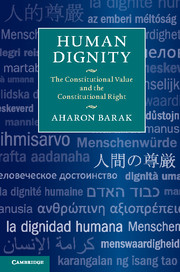Book contents
- Frontmatter
- Contents
- Preface
- Acknowledgements
- Table of Cases
- Part I Fundamental concepts and sources
- Part II Human dignity as a constitutional value
- Part III Human dignity as a constitutional right
- 8 Recognition of the constitutional right to human dignity and its content
- 9 Human dignity as a framework right (mother-right)
- 10 The area covered by the right to human dignity
- Part IV Human dignity in comparative law
- Bibliography
- Index
- References
9 - Human dignity as a framework right (mother-right)
Published online by Cambridge University Press: 05 February 2015
- Frontmatter
- Contents
- Preface
- Acknowledgements
- Table of Cases
- Part I Fundamental concepts and sources
- Part II Human dignity as a constitutional value
- Part III Human dignity as a constitutional right
- 8 Recognition of the constitutional right to human dignity and its content
- 9 Human dignity as a framework right (mother-right)
- 10 The area covered by the right to human dignity
- Part IV Human dignity in comparative law
- Bibliography
- Index
- References
Summary
Framework rights
Constitutional rights designed as principles – such as property, liberty and privacy – are, inherently, framework rights. On the other hand, constitutional rights designed as rules – such as the right of a citizen to vote or to enter his country – are particular rights. A framework right is based upon generality. It has an open range of application. The framers of the constitution did not include the particular factual and legal elements for the application of the right from its underlying constitutional value in the constitutional language. Inherently, framework rights do not focus upon a particular type of act, nor do they protect particular human conduct.
A constitutional right formulated as a principle serves as a “common roof,” under which a wide variety of situations crowd together. Common to all of them is that they are expressions of the general principle that shapes the right. For the sake of convenience, these situations can be cataloged and grouped into categories, all of which fall within the general principle. Under the canopy of the constitutional framework right, constitutional rights derived from it or that radiate from it crowd together. These rights are inherently of a lower level of generality than the framework right. Most of these rights are themselves framework rights at a lower level of generality. They too provide a platform for deriving daughter-rights. At the lowest level of generality there will be a number of particular rights that focus upon a specific type of act and particular human conduct. They reflect legal norms that are rules. For example, the right to liberty in the US Constitution is a framework right. The right to privacy is derived from it at a lower level of generality. A woman’s right to have an abortion is derived from that right at an even lower level of generality. At the lowest level of generality the rule granting a specific woman the right to an abortion will be derived.
- Type
- Chapter
- Information
- Human DignityThe Constitutional Value and the Constitutional Right, pp. 156 - 169Publisher: Cambridge University PressPrint publication year: 2015



